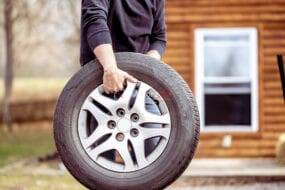Winter Driving Survival Guide: Navigating Snow and Ice Safely a picturesque landscape blanketed in snow, but it also presents challenges on the road. Navigating through snow and ice demands a unique set of skills and precautions. In this Winter Driving Survival Guide, we will explore essential tips to ensure your safety and the safety of others during the chilly months.
Preparation is Key
Don’t forget to inspect your heating system and defrosters to ensure they’re working efficiently. And hey, packing an emergency kit with essentials like blankets, snacks, and a flashlight wouldn’t hurt either. It’s better to be over-prepared than stranded in the cold. Before hitting the road, make sure your vehicle is winter-ready. This includes checking the tire tread, battery, brakes, and fluid levels. Consider switching to winter tires for better traction on icy roads.
Pack an Emergency Kit
A reflective vest can be a lifesaver, quite literally, especially if you’re dealing with car trouble at night. And don’t forget good old duct tape; it’s the handyman’s secret weapon for quick fixes. Equip your car with an emergency kit containing essentials such as a blanket, flashlight, extra batteries, non-perishable snacks, water, a first aid kit, and a shovel. These items can prove invaluable in case of unexpected delays or emergencies.
Stay Informed
Keep an eye on weather forecasts and road conditions before embarking on your journey. Plan your route, and if possible, choose well-traveled roads that are more likely to be plowed and salted. And let’s not forget about good ol’ maps. Sure, GPS is a lifesaver, but having a physical map as a backup can save the day if technology decides to take a detour.
Drive Slow and Steady
One of the most crucial aspects of winter driving is adjusting your speed. Slow down and leave ample space between you and the vehicle in front to account for reduced visibility and slippery roads. Learn to brake gently to avoid skidding. If not, pump the brakes gently. Practice braking in an empty, snow-covered parking lot to get a feel for how your car responds.
Master the Art of Skidding
Despite precautions, skidding may happen. If you find yourself skidding, steer in the direction you want to go and avoid slamming on the brakes. This technique can help you regain control. Ensure that all windows, mirrors, and lights are clear of snow and ice before driving. Use a good-quality ice scraper, and consider carrying de-icing fluid to prevent freezing. Winter driving demands heightened concentration. Minimize distractions, such as phone use, and keep your attention on the road. Be aware of the movements of other vehicles and anticipate potential hazards.
Respect Snowplows
If you encounter a snowplow on the road, give it plenty of space. Plows have limited visibility, and the road ahead may be more treacherous than it appears. Avoid passing snowplows unless absolutely necessary Sometimes, the best decision is not to drive at all. If weather conditions are severe, consider postponing your trip until conditions improve. Your safety is paramount.
Conclusion
As Winter Driving Survival Guide the world in a serene layer of snow, it’s crucial to approach driving with a heightened sense of responsibility. By preparing your vehicle, staying informed, driving with caution, and knowing how to respond to challenging situations, you can navigate snow and ice safely. This Winter Driving Survival Guide serves as a reminder that with the right mindset and precautions, you can turn winter driving from a daunting task into a manageable and safe experience for you and those sharing the road. Drive safely and enjoy the beauty of winter responsibly.





